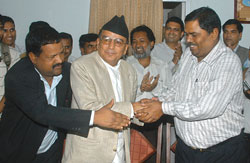|
|
The Kathmandu-Madhesi political disconnect is worrying. A day after the government-MJF deal (above), the two leading English dailies reported that the tarai tangle was resolved. But events over the past week have shown that the accord has in fact led to further polarisation.
So what triggered this sudden agreement? Upendra Yadav stood his ground as long as he was convinced polls would not take place in November. But with Indian pressure mounting for elections, Yadav felt he might miss the bus.
Given the shrinking MJF base, and the fact that people were in no mood for more agitation, Yadav decided to lap up the legitimacy the government gave him as the representative of the madhes movement. He felt the deal would portray him as a responsible leader and ensure that if polls were delayed, he would not be blamed.
The Indians assured Yadav of support for the polls while making it clear he would invite Indian wrath if he did not compromise. India was motivated by its desires to engineer a breakthrough in Madhes to hold the polls, and to form the basis for a 'democratic' alliance in the plains to defeat the leftist parties.
Sources in Baluwatar and MJF confirm that Yadav has been assured of financial and political support to help him win a minimum number of seats. Yadav, who is terrified of the Maoists, was also promised full security.
So how has this deal been received? It does create some positive momentum and address some demands at the heart of Madhesi discontent. Many issues in the deal had already been agreed elsewhere. What is now needed is implementation.
Nevertheless, it is positive that the promise of inclusion has been reiterated. Some in Madhesi civil society give Yadav credit for attempting to break the deadlock and create a suitable environment for polls.
But the agreement has also bred resentment. It does not reflect slogans that had become emotive issues on the ground-a fully PR electoral system, recognition of madhes as one unit, an immediate increase in madhesi presence in political positions and bureaucracy.
For madhesis, these have come came to symbolise their aspiration for a rightful share in the power structure. The radicalisation engineered by the MJF and others has now led people to suspect Yadav has sold out.
He has a lot of explaining to do on why he conceded several core issues. And it is in this respect-communicating his strategy and decisions, and engaging with others-where he has been an abject failure. More than the substance, the problem is with the process and manner in which the deal was done.
Yadav has been in Kathmandu for more than two months. He signed the deal unilaterally without consulting his close advisers, and has done nothing since then to explain his reasons for the compromise.
With the government silent, district units of NC inert and angry with the party leadership for giving MJF more weight than it deserved, and Yadav still not out in madhes, there are few active proponents of the deal. Even those in civil society who are supportive do not want to be seen as apologists for a weak MJF and a leader addicted to Kathmandu power politics.
It is these factors that have given the MJF dissidents the confidence to walk away. At the same time, the Maoists sense a chance to regain lost ground in the terai. Their strategy is to dismiss the MJF deal, press for PR and round-table talks, and engage with select Madhesi groups for further agitation.
The vacuum also presents an opportunity for those who do not want a solution at all and wish to create instability.
The deal does not help address any of the fault-lines that exist in the tarai, between state and madhesis, among madhesi groups, between Maoists and madhesis, or between pahadis and madhesis.
The agreement's relevance lies not in finding a long-lasting solution, but in the fact that it has added actors and reconfigured alliances in madhes, besides generating illusions in the capital.




